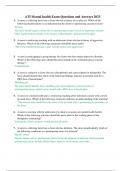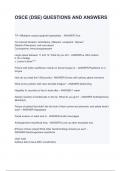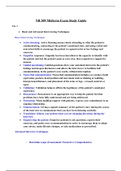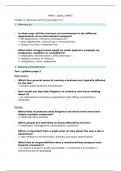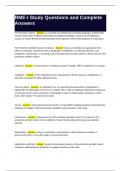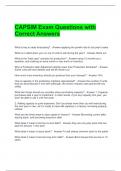1. Introduction
1.1. What is auditing?
Auditing is a systematic process where the auditor:
➢ obtains and evaluates evidence regarding about economic actions,
➢ will collect evidence to evaluate assertions of the management process individually
➢ communicate results of his evaluation with the interested users
To perform an audit, there must be a criteria where the auditor can evaluate the information, it can be:
1. quantifiable: auditing a company’s financial statements*
2. subjective: auditing the effectiveness (doeltreffendheid) of IT systems and the efficiency (efficientie) of operations
* For the audit of financial statements, the criteria may be the:
➢ BGAAP: a rule book that generally is accepted in Belgium, book value
➢ IFRS: rules for the international content, marked to market
What is evidence (bewijsmateriaal)? all information used by the auditor to determine whether the information being audited is
in accordance with the established criteria, it can be:
➢ electronic data about transactions
➢ observations by the auditor
➢ oral statement of the client
➢ written/electronic communication with outsiders
1.2. Auditing VS accounting
● Auditing = independent examination of accounting and financial statements (usually concerned with accounting +
auditors have considerable (= aanzienlijke) expertise in accounting matters)
● Accounting = the recording
Classifying of economic events of a company
summarizing
1
,The difference: an auditor is not involved with financial statements preparation, he only evaluates/ examines them individually
+ auditors need financial statements of accounting so that they can evaluate them → they cannot audit them without
accounting!
why? because auditors are not required to make preparations of financial statements, someone needs to do it for them = the
accountants
In Belgium:
➢ non-listed companies: must follow the Belgium GAAP for setting up their individual and consolidated financial
statements (opstelling)
➢ listed companies: are required to use Belgium GAAP for the preparation of their individual financial statements
(voorbereiden)
1.3. Types of audit
1.3.1. Financial audit: the process of examining an organization's financial records (financieel verslag) to determine if they are
accurate and in accordance with any applicable rules (toepasselijke regels), regulations and laws (voorschriften en
wetten)
→ in determining whether financial statements are fairly stated in accordance with accounting standards: the auditor
gathers (verzamelt) evidence to determine whether the statements contain material errors or other misstatements.
external auditors: come in from outside the organization to examine accounting & financial records and provide (geven)
an independent opinion on these records.
the financial audit:
➢ will be executed in compliance with the ISA (international standards on auditing)
➢ should follow guidelines such as those issued by IFAC
2
,1.3.2. Operational audit: an examination of the manner in which an organization conducts its business, with the objective of
pointing out improvements that will increase its efficiency and effectiveness.
Conducting an operational audit can include the evaluation of:
➢ organizational structure
➢ computer operations
➢ production methods
➢ marketing,...
Operational audits are usually conducted by the internal audit staff, but it can also be reviewed by hired specialists
internal audit is typically centralized around certain key activities which include:
➢ monitoring the effectiveness of internal controls and proposing improvements
➢ monitoring compliance with laws and regulations
➢ investigating instances of fraud and theft
➢ evaluating risk management policies and procedures of the company
➢ examining the effectiveness, efficiency and economy of operations and processes
1.3.3. Forensic audit: Forensic auditors are investigators (onderzoekers) of legal and financial documents that are hired to look
into possible fraudulent activities within a company.
fraudulent activities (frauduleuze activiteiten) involve:
➢ money laundering (witwassen van geld)
➢ tax evasion (belastingontduiking)
➢ employee fraud (werknemers fraude) Companies can hire a forensic auditor to prevent all these
➢ bankruptcy fraud (faillissementsfraude) fraudulent activities.
➢ insider trading
➢ financial statement fraud (incorrecte informatie boekhouding) vb. omega pharma vs perrigo
3
, 1.3.4. Compliance audit: is conducted to determine whether the company is following specific procedures, rules, or
regulations set by some higher authority. compliance = to respect certain rules (gehoorzamen, in regel zijn)
The results of this audit are reported to the management, this is because management is primary concerned about
compliance (naleving) with procedures, rules and regulations.
For example: having an audit performed on the health and safety legislation (wetgeving) of Belgium
why? The legislation changes a lot through the years. a compliance audit can be performed to assure that the company
meets all changes that are made
1.3.5. Information Technology audit: involves the assessment of the controls (beoordeling van de controles) relevant to the IT
infrastructure within an organization.
+ Many organisations spend large amounts of money on IT because they recognise the benefits (voordelen) that IT can
bring to their operations and services, IT audit could also help to reduce risks of data loss or leakage, service
disruption, etc.
!! : Many users rely on IT without knowing how computers work. A computer error could be repeated indefinitely, causing
more damage than a human mistake.
ISACA (information systems audit and control association): this certification offers a standard of achievement for
auditing, controlling, monitoring and assessing an organization's information technology system.
2. Internal and external control
4
1.1. What is auditing?
Auditing is a systematic process where the auditor:
➢ obtains and evaluates evidence regarding about economic actions,
➢ will collect evidence to evaluate assertions of the management process individually
➢ communicate results of his evaluation with the interested users
To perform an audit, there must be a criteria where the auditor can evaluate the information, it can be:
1. quantifiable: auditing a company’s financial statements*
2. subjective: auditing the effectiveness (doeltreffendheid) of IT systems and the efficiency (efficientie) of operations
* For the audit of financial statements, the criteria may be the:
➢ BGAAP: a rule book that generally is accepted in Belgium, book value
➢ IFRS: rules for the international content, marked to market
What is evidence (bewijsmateriaal)? all information used by the auditor to determine whether the information being audited is
in accordance with the established criteria, it can be:
➢ electronic data about transactions
➢ observations by the auditor
➢ oral statement of the client
➢ written/electronic communication with outsiders
1.2. Auditing VS accounting
● Auditing = independent examination of accounting and financial statements (usually concerned with accounting +
auditors have considerable (= aanzienlijke) expertise in accounting matters)
● Accounting = the recording
Classifying of economic events of a company
summarizing
1
,The difference: an auditor is not involved with financial statements preparation, he only evaluates/ examines them individually
+ auditors need financial statements of accounting so that they can evaluate them → they cannot audit them without
accounting!
why? because auditors are not required to make preparations of financial statements, someone needs to do it for them = the
accountants
In Belgium:
➢ non-listed companies: must follow the Belgium GAAP for setting up their individual and consolidated financial
statements (opstelling)
➢ listed companies: are required to use Belgium GAAP for the preparation of their individual financial statements
(voorbereiden)
1.3. Types of audit
1.3.1. Financial audit: the process of examining an organization's financial records (financieel verslag) to determine if they are
accurate and in accordance with any applicable rules (toepasselijke regels), regulations and laws (voorschriften en
wetten)
→ in determining whether financial statements are fairly stated in accordance with accounting standards: the auditor
gathers (verzamelt) evidence to determine whether the statements contain material errors or other misstatements.
external auditors: come in from outside the organization to examine accounting & financial records and provide (geven)
an independent opinion on these records.
the financial audit:
➢ will be executed in compliance with the ISA (international standards on auditing)
➢ should follow guidelines such as those issued by IFAC
2
,1.3.2. Operational audit: an examination of the manner in which an organization conducts its business, with the objective of
pointing out improvements that will increase its efficiency and effectiveness.
Conducting an operational audit can include the evaluation of:
➢ organizational structure
➢ computer operations
➢ production methods
➢ marketing,...
Operational audits are usually conducted by the internal audit staff, but it can also be reviewed by hired specialists
internal audit is typically centralized around certain key activities which include:
➢ monitoring the effectiveness of internal controls and proposing improvements
➢ monitoring compliance with laws and regulations
➢ investigating instances of fraud and theft
➢ evaluating risk management policies and procedures of the company
➢ examining the effectiveness, efficiency and economy of operations and processes
1.3.3. Forensic audit: Forensic auditors are investigators (onderzoekers) of legal and financial documents that are hired to look
into possible fraudulent activities within a company.
fraudulent activities (frauduleuze activiteiten) involve:
➢ money laundering (witwassen van geld)
➢ tax evasion (belastingontduiking)
➢ employee fraud (werknemers fraude) Companies can hire a forensic auditor to prevent all these
➢ bankruptcy fraud (faillissementsfraude) fraudulent activities.
➢ insider trading
➢ financial statement fraud (incorrecte informatie boekhouding) vb. omega pharma vs perrigo
3
, 1.3.4. Compliance audit: is conducted to determine whether the company is following specific procedures, rules, or
regulations set by some higher authority. compliance = to respect certain rules (gehoorzamen, in regel zijn)
The results of this audit are reported to the management, this is because management is primary concerned about
compliance (naleving) with procedures, rules and regulations.
For example: having an audit performed on the health and safety legislation (wetgeving) of Belgium
why? The legislation changes a lot through the years. a compliance audit can be performed to assure that the company
meets all changes that are made
1.3.5. Information Technology audit: involves the assessment of the controls (beoordeling van de controles) relevant to the IT
infrastructure within an organization.
+ Many organisations spend large amounts of money on IT because they recognise the benefits (voordelen) that IT can
bring to their operations and services, IT audit could also help to reduce risks of data loss or leakage, service
disruption, etc.
!! : Many users rely on IT without knowing how computers work. A computer error could be repeated indefinitely, causing
more damage than a human mistake.
ISACA (information systems audit and control association): this certification offers a standard of achievement for
auditing, controlling, monitoring and assessing an organization's information technology system.
2. Internal and external control
4


